Bitcoin domain name BNS speculation frenzy: opportunity or risk?
Bitcoin domain speculation: opportunity or risk?Author: Xiyu
On May 28th, a screenshot of the 001.btc domain name selling for 0.3 BTC (about $81 million) was circulating in various crypto communities. According to the seller of the domain name, he engraved the domain name in February, spending about $10, and the profit from this transaction is more than 800 times. This transaction has completely ignited the enthusiasm of Bitcoin domain name players.
In fact, the 001.btc domain name is a text inscription (Text) content that users engraved based on the Bitcoin Ordinal protocol. Although it looked like a domain name with a .btc suffix in the early days, it did not have the so-called domain name function and did not support Bitcoin address resolution. Users only held text NFTs.
With the completion of the 001.btc transaction, text domain names based on the Ordinal protocol have begun to attract the attention of users and related service providers and truly domainize them to provide related functions.
- The next trillion-dollar market? Global financial giants are rushing to embrace RWA tokenization
- Pre-Musk’s call Milady: A “cyber psychopath” pushed to the extreme
- What impact will the upcoming legalization of stablecoins have on the market in Japan?
Domain names have become a new hot spot in the Bitcoin ecosystem after BRC 20 and NFT. Domain name players are racing against time to engrave new domain names, afraid of missing this wealth train. Some applications on the Bitcoin chain have also begun to support Bitcoin domain name services. On May 30th, the Bitcoin inscription transaction and wallet service platform Ordinals Wallet announced its support for domain name resolution such as .btc and .sats. Now users can use domain names to send and receive Bitcoins and inscriptions; on May 31st, the Bitcoin wallet Unisat launched a domain name trading market, supporting the trading of domain names with suffixes such as .sats and .unisat.
Ordinal protocol inscriptions can be engraved by anyone, which means that users can engrave any text similar to domain names with .xxx character suffixes. Currently, a consensus domain name has been formed in the Bitcoin text domain name market with a series of suffix character domain names such as .btc, .sat, .sats, and .ord.
In addition, some domain name service providers have also begun to provide domain name services, but the ecosystem is very chaotic. Among them, there are three .btc domain names, including text .btc domain names, BTC.US .btc domain names based on Stacks chain, and Jason-format .btc domain names launched by decentralized domain name service provider BTCDomain based on Ordinals. Although they all seem to be .btc, they are operated by three different domain name merchants and operation systems.
Currently, according to the domain name payment mechanism, the products in the Bitcoin domain name (BNS) market can be roughly divided into two categories: one is the lease payment domain name dominated by domain name service providers, which requires payment of annual service fees, representing products such as BTC Domain and BTC.US; the other is Ordinals text domain names (.sats, .sat, etc.), which only require on-chain gas fees at the time of inscription and are valid for life.
So, what are the differences between these domain names? What are their uses? How do we choose? This article will try to provide some answers.
About Bitcoin BNS
BNS (Bitcoin Name Service) is the general name of Bitcoin domain name service, which refers to the domain name service built on the Bitcoin blockchain network. The function of BNS is similar to that of Ethereum domain name service ENS, which can convert Bitcoin addresses into characters that are easy for humans to remember and identify, forming Bitcoin domains ending in “.btc”, “.sats”, “.sat”, etc.
BNS is a converter of addresses on the Bitcoin chain, which can convert address strings that do not need to start with “bc 1 p” on Bitcoin into domain name characters that are easy to recognize, similar to Twitter or Weibo usernames. When users bind Bitcoin addresses to domain names, they can use domain names to send and receive on-chain assets such as BTC without copying or entering complex Bitcoin addresses. At the same time, BNS domain names are also users’ identity credentials in the world of Bitcoin chain, and in the future, users can use their BNS to log in to Web3 applications, displayed as usernames, and manage corresponding wallet addresses and data, etc.
In addition, some social accounts, email and other Internet accounts can also support users to bind BNS domain names, and the NFTs they hold can be recorded on the domain name, or set as domain name avatars, etc., such as the decentralized social application Damus supports users to use .sats domain names as usernames.
What are BNS domain names? How to choose?
Today, in the Bitcoin ecology, according to the different payment methods, there are mainly two ways for users to obtain domain names: one is the paid lease domain name provided by domain name service providers, represented by projects such as BTC.US and BTCDomain; the other is the text domain name (Text) generated based on the Ordinals protocol.
Since text domain names (Text) belong to the inscription wallet address for life once they are inscribed, and no subsequent fees are required, and there is no project issuer, everyone is equal, anyone can inscribe the domain name they want according to their own preferences, so text domain names are currently the most popular and popular in the Bitcoin domain name market.
However, before the surge in text-based domain names, developers had already deployed Bitcoin domain-related products, such as BTC.US and BTCDomain. Among them, the most common type of domain name suffix is .btc. Both BTC.US and BTCDomain provide domain name services with the .btc suffix, and users also generate text-based .btc domain names spontaneously through Ordinals. This means that there are currently three types of .btc domain names in the Bitcoin ecosystem. This is mainly because .btc is easier for users to recognize and propagate due to its association with BTC, making it the preferred suffix for domain name service providers.
So what are the differences between these three types of .btc domain names? How should users choose?
1. Ordinals Text-based Domain Names: Equal Issuance with Only Gas Fees
Text-based domain names (Text) mainly refer to character content similar to domain names issued based on the Bitcoin Ordinals protocol. Users only need to pay on-chain gas fees to inscribe them. Once inscribed, they are valid for life and there are no additional fees. The main representatives include “.btc”, “.sat”, “.sats”, “.ord”, and “.unisat”.
The Ordinals protocol makes each satoshi (sats), which is the smallest unit of Bitcoin, unique by inscribing inscriptions on it, thus generating Ordinals NFTs. Using the Ordinals protocol to issue domain names essentially means inscribing the domain name string (text-based inscriptions) on sats. This is why the domain name has always been referred to as Text.
Since the domain name is a text-based inscription, it conforms to the rules of inscriptions: it supports anyone to inscribe any suffix of a domain name through code and first come, first served. The former can be understood as anyone can deploy a domain name with any character suffix, such as .uniswap, .bank, .pepe, etc.; the latter rule is that for the same domain name, the one registered first is valid, and the rest are invalid domain names. In other words, it does not limit users from registering domain names with the same characters, but once the inscription of that domain name is registered, later registrations of the same domain name are invalid and not recognized or accepted by the market. For example, if someone registered 001.btc for the first time in February, others can also register 001.btc later, but the later 001.btc is an invalid inscription.
The process of inscribing a domain name inscription is similar to deploying a BRC 20 token, except that the inscription on the BRC 20 token is unified Jason data, while the inscription on the domain name is a unique string. Therefore, each inscription domain name is also an Ordinals NFT asset.
In the current Bitcoin text-based domain names, the domain names are not case-sensitive, and there is no difference in engraving and recognition between upper and lower case. That is to say, if someone has already minted SUSHI.btc, you do not need to mint SUshi.BTC/sushi.btc, etc., because this domain name has already been taken, and anything after it is invalid.
Although Ordinals supports engraving domain name inscriptions for any suffix characters, it does not mean that domain name characters with any suffix can necessarily become domains and have value. If it does not have the function of a domain name (such as not supporting binding of a Bitcoin wallet address), or if there is no consensus, it can only be a text-based inscription NFT.
That is to say, whether text inscriptions similar to domain names such as .xxx, .btc, .sat, .sats, .stas, .ibx, .gm can become so-called domain names depends on whether everyone has consensus on it, and whether wallets or related service providers provide domain name-related functional services, such as supporting address resolution, which can be used to receive assets or log in to decentralized applications, etc. Only with the support of domain name-related functions, these text inscriptions similar to domain names may have domain name value.
Taking the .btc, .sat, .stas, .sats, .ibx, .gm domain names as an example, the current Unisat wallet supports parsing .sats, so users can use .sats domain names to receive and send Bitcoin assets; there is also a decentralized social application Damus that supports setting usernames as .sats, so users can use .sats as their identity representative. At this time, .sats has already had the function of a domain name, while other xxx suffix pure text domain names are just text-based NFTs because they do not have wallet applications to support address resolution or other domain name functions.
How to obtain a text-based domain name?
If the domain name has been registered, users can purchase it in the Bitcoin NFT trading market or over-the-counter peer-to-peer, and the price depends on the seller’s listed price; if the domain name has not been registered, users can mint it directly using the platform that supports Bitcoin inscription, or using code. Only need to pay Gas fee on the Bitcoin chain (currently about 3 US dollars per transaction), no other fees will be charged in the later period.
Taking the Unisat platform as an example, to mint a new domain name:
Step 1:
Before registering, you need to check whether the domain name has been registered.
Use the platform’s search function (Search) and enter the desired domain name to see if it already exists. If it already exists, any subsequent registration attempts will be invalid. It should be noted that during the duplicate checking process, some reasons may cause the data to be not very accurate, and users may need to check for duplicates on multiple platforms and cross-validate.
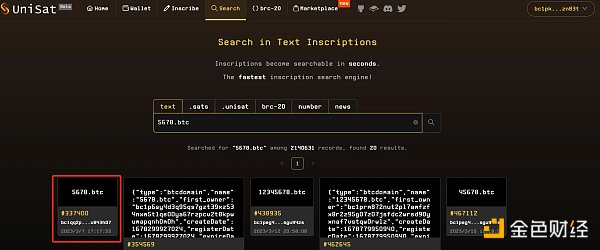
Step 2: Once the domain name has been confirmed to be available, use the platform’s Inscribe function to register the inscription. Since Unisat supports .sats and .unisat, the user only needs to click on the relevant domain name suffix, enter the characters they want to register, and can forge multiple domains in batches.
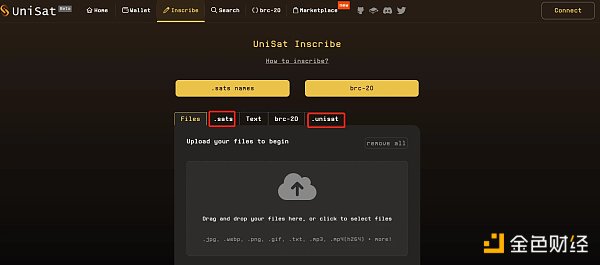
If there are no relevant domain name suffixes on Unisat, users can enter the desired character suffix domain name through the Text (text-based) dialog box, which supports batch forging of domains with different suffixes.
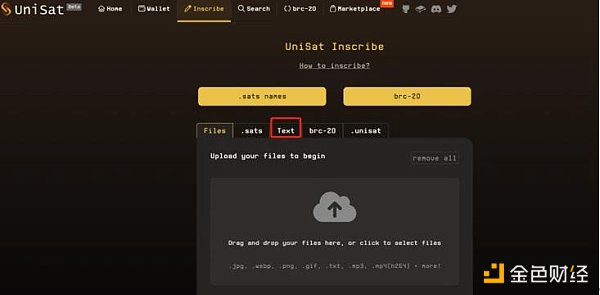
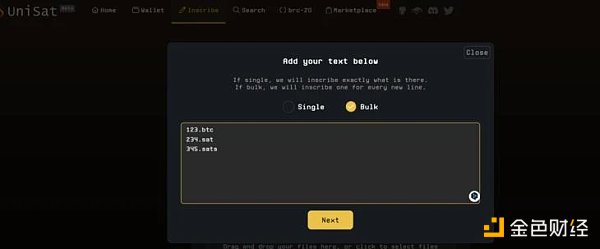
What are some well-known text-based domain names?
-
Bitcoin Name Service (.btc) – a community-organized domain name with a .btc suffix, with satoshi.btc already forged and donated to the Bitcoin Foundation. As of May 31, according to Unisat retrieval, there are 100,000 registered .btc domain names.
-
sat.names (.sat) – sat is an abbreviation for Satoshi, with a registered domain count of 307,000.
-
sats.names (.sats) – sats is a shorthand for Satoshi, with a registered count of 298,000.
-
.unisat – introduced by the Unisat wallet, users with .unisat can enjoy a platform fee discount.
-
.ord – ORDI is the first token to pay tribute to BRC 20.
Tools for text-based domain names
Check and engrave new domain names
-
iDclub – can be used for domain name checking, batch registration, and will charge a certain handling fee.
-
Unisat – supports domain name checking and registration. On May 31, the .sats and .unisat domain name trading markets were launched, and their domain names can also be resolved to Bitcoin wallet addresses. Users can receive Bitcoin assets and inscriptions using .sats and .unisat domain names.
-
Best in Slot – aggregates various assets of the Ordinals protocol, including NFTs, domain names, inscriptions, etc., which can be used to check for duplicates and view the holding address information of each inscription.
-
Domain name secondary trading market
-
Ordinals Wallet – similar to Unisat, it integrates wallet and Ordinals asset trading functions. On May 30, it announced that it has been launched to support .sats, .btc, .unisat, .xbt and other domain names, and supports domain name resolution to Bitcoin wallet addresses, which means that users can bind these domain names to Ordinals Wallet Bitcoin addresses and use domain names to receive and transfer assets.
-
Ordswap – also a platform that integrates wallet and Ordinals asset trading functions, supports text-based domain name listing transactions.
-
Magic Eden – added a Bitcoin NFT market and supports domain name trading such as .btc.
2.BTC.US: .btc domain name issued on the Stacks network
BTC.US is a domain name service system with a “.btc” suffix built on smart contracts based on Stacks. Stacks is a Bitcoin smart contract chain that provides smart contract functionality support for Bitcoin, helping to deploy DeFi, NFTs and various decentralized applications.
Currently, if users want to obtain a domain name on BTC.US, they need to apply for registration through wallets such as Hiro or Xverse on its official website and pay with the Stacks platform’s native token STX. Each registration requires a one-time payment of 2 STX tokens for a 5-year annual fee (about $1.3), which will be automatically deducted at the end of the term.
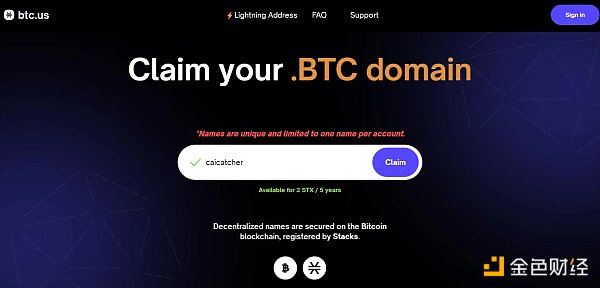
BTC.US-provided domain names
The .btc domain name provided by BTC.US supports users to bind Stacks chain addresses and Lightning Network addresses, allowing users to receive and send Stacks ecosystem assets and Lightning Network assets through the .btc domain name.
From this, it can be seen that the .btc domain name of BTC.US is generated based on the Stacks chain, and the data is stored in Stacks. Its main function is as an identity pass for Stacks network and its ecosystem.
3.BTCDomain: Pay-for .btc domain name provided by Ordinals
BTC Domain provides .btc domain name services based on the Bitcoin Ordinals protocol. It is more like a comprehensive domain name service platform, not only providing domain name registration, but also domain name resolution and other related services. It is committed to providing a user-friendly domain name service platform for the Bitcoin community, and its product operation method is similar to ENS on Ethereum.
If users want to obtain a domain name on BTC Domain, they need to have an Ordinals-type wallet address. In addition to paying the Gas fee on the Bitcoin chain during the registration process, they also need to pay an annual service fee, and can choose to pay for up to 5 years at most.
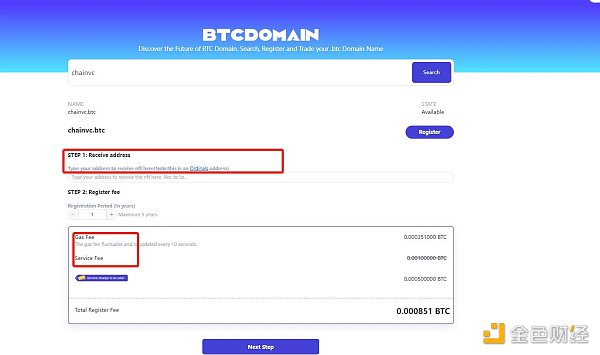
When registering a domain name on the BTC Domain platform, the cost varies depending on the length of the domain name. The annual service fee for a 4-character domain name is 0.01 BTC (about $280); for a 5-character domain name, it is 0.004 BTC (about $112); for domain names with 6 or more characters, the annual service fee is 0.001 BTC (about $28). Currently, there is a 50% discount on the annual service fee.
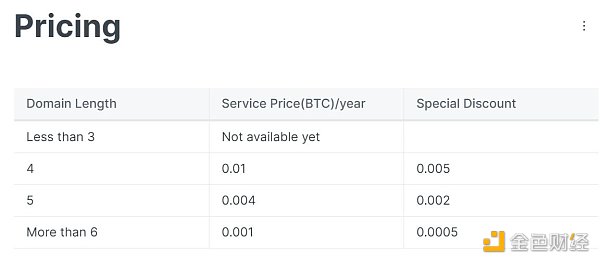
Charging situation on BTC Domain
The .btc and text-based domain names provided by BTC Domain are also domain names based on Ordinals, but the two operation systems are completely different. According to the official statement, the .btc provided by BTC Domain is designed to be deduplicated and anti-counterfeiting in Json format at the initial design stage. Therefore, registering a .btc domain name through BTC Domain has ensured uniqueness due to deduplication.
Compared to BTC.US’s .btc, BTC Domain provides .btc domain name data that is completely stored on the Bitcoin chain. It is a native Bitcoin domain name that can be bound to a Bitcoin wallet address. Users can receive and send Bitcoin and inscriptions assets through their .btc domain name.
In addition, the .btc domain name resolved by BTC Domain is not only a Bitcoin wallet address, but can also resolve web content. This is a convenient solution for companies, charities, and individuals who want to create identifiable identities for their Bitcoin transactions. Currently, BTC Domain’s .btc supports the resolution of Tokenview, TP Wallet, Foxwallet Wallet, etc.
However, some users have expressed that because of the existence of the BTCDomain official, it is not as decentralized as text-based domains. In addition, the cost paid by users for the leasing model is too high. In response, the official stated that it is precisely because there is a BTCDomain team that more resources will be invested in the development and management of .btc, which will make .btc domain names have more application scenarios.
Wild growth of Bitcoin domain names makes it difficult to unify
Although Bitcoin domain names bring convenience to users for managing chain addresses, the domain name service system is not yet sound due to the early stage of development. Since anyone can engrave the .xxx suffix on text-based domain names, there are multiple suffix characters in today’s Bitcoin domain name market (such as .btc, .sat, .sats, .ord, .xbt, etc.), and there may be more in the future, such as .uniswap and .xen. In the short term, it is difficult to achieve unity in domain name suffix characters, domain name resolution methods, and registration format requirements within the Bitcoin ecology.
Taking .btc domain names as an example, although the btc character of the suffix is easy for users to recognize and spread, behind it are three different service providers and operating systems. Although BTC.US’s .btc uses the btc suffix, its functions and usage scenarios are more biased towards the domain names in the Stacks ecology. Although BTC Domain’s .btc is a native Bitcoin domain name that supports multiple wallet resolutions, it has been criticized by users for its fees, domain name registration restrictions, and centralization issues, which are not pure enough. Although text-based .btc is popular with users because of its no follow-up fees and relatively fair issuance methods, the application scenarios and resolution of text-based domain names are still issues that require community self-organization and operation. Currently, only Ordinals Wallet addresses support the resolution of .btc text-based domain names. Although these 3 .btc have differences in product design and operation mode, they are easily confused for most users.
Moreover, even if they belong to the same text-based domain (such as .sats, .ord, .unisat, etc.), the registration rules are not uniform. For example, some domain names support spaces or special characters and emojis, while others do not.
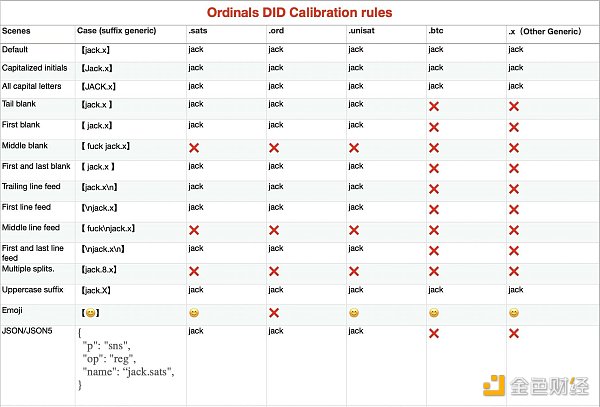
There are differences in the format of text-based domain names, and the picture comes from .btcdao.
In terms of domain name usage scenarios, especially in terms of address resolution, they are also divided into various schools of thought. For example, some wallets only support partial text-based domain name resolution. In addition, the domain name resolution rules and types between wallets are not unified.
Ordinal Wallet supports .sats, .btc, .unisat, .xbt, and other domain name resolution services; Unisat supports .sats and .unisat domain name resolution, and its online domain name market currently supports transactions of .sats and .unisat suffix domain names; TP Wallet supports the resolution of .btc in BTC Domain. This means that users can only use the same wallet to transfer and receive assets using domain names. For example, Xiaoming’s .btc domain name in Ordinal Wallet does not support the btc transfer of TP Wallet’s .btc domain name address, etc.
In addition, the speculative component of text-based domain names is greater than their actual application. Although text-based domain names are valid for life and have no additional fees once registered, their current application scenarios are single, and most suffix characters do not have wallet support for address resolution and do not have the function of domain names. The transactions of these domain name characters are more about speculating on future expectations, and their prices rise once they are supported by wallet resolution.
Furthermore, seemingly text-based domain names are equal when engraved, but the reality is not so. Some users have engraved a large number of 3D (3-character) and 4D (4-character) premium domain names before promoting certain suffix domain names, and then come out to raise the price of domain names and profit from them. Therefore, users need to understand the risks when investing in text-based domain names.
In addition to the chaos of the Bitcoin domain name market itself, the development of the decentralized domain name ecosystem itself is controversial, and many people question whether domain names are a good business in the Web3 world. Taking the decentralized domain name leader ENS as an example, according to Dune data, the registration volume in May was only 15,702, the lowest level since June last year, while in September 2022, the peak month, the monthly registration volume reached as high as 400,000. Since September last year, the monthly registration volume of ENS has been declining. After the airdrop heat of the SBlockingce ID.bnb domain name project on the Binance chain, the attention has decreased significantly; the Bonfida (.sol) domain name project on Solana has registered only 716 in the past 7 days.
Will Bitcoin domain names follow in the footsteps of NFTs and become a flash in the pan? Although it is currently in an early stage of wild growth, from its current popularity, it seems that the .btc, .sats, .sat, and other community organizations are spontaneously and actively developing the market, attracting more wallet support for domain name resolution to expand more application scenarios. In the future, there may even be a dedicated text domain name resolution service. As for which suffix character will ultimately become the king of Bitcoin ecological domain names, it still requires time and the community to jointly select.
We will continue to update Blocking; if you have any questions or suggestions, please contact us!
Was this article helpful?
93 out of 132 found this helpful
Related articles
- Is the US regulatory agency the reason behind the decline in cryptocurrency trading volume?
- U.S. Digital Chamber of Commerce Blocks Texas’ Anti-Bitcoin Energy Bill
- How LSTFi is Leveraging the $100 Billion Liquidity Collateral Market
- Bankless: What has the market learned one year after the UST crash?
- Bitcoin Virtual Machine BVM is released, ushering in the era of smart contracts?
- Bitcoin Virtual Machine (BVM) is released, ushering in the era of smart contracts?
- 【Exclusive from ChainDD】Russia abandons the plan to build a national cryptocurrency exchange in order to respond to financial sanctions as soon as possible.






